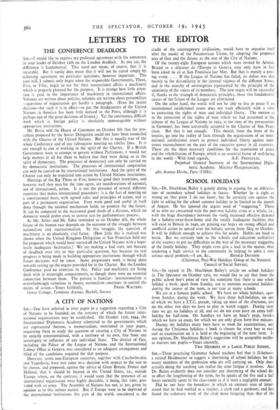LETTERS TO THE EDITOR THE CONFERENCE DEADLOCK
Sta,—I would like to express my profound agreement with the comments in your leader of October 12th on the London deadlock. As you say, the difference is fundamental. This need not mean, of course, that it is incurable. But it surely does mean that it will not be cured simply by achieving agreement on particular questions, however important. The cure will, I submit, only begin when the responsible Governments, Three, Five, or Fifty, begin to use for their international affairs a machinery which is properly planned for the. purpose. It is strange how little atten- tion is paid to the importance of machinery in international affairs. Volumes are written about policies, columns are written about personalities —questions of organisation get hardly a paragraph. (Even the recent decision—for such it is in effect—to put the headquarters of the United Nations in America has been little noticed in the Press, although it is perhaps one of the great decisions of history.) Yet the continuous, difficult work which is foreign policy is absolutely unmanageable without appropriate institutions. Mr. Bevin told the House of Commons on October 8th that the pro- cedure proposed by the Soviet Delegation could not have been reconciled with the Charter of the United Nations. But this is equally true of the whole Conference and of any subsequent meeting on similar lines. It is not enough to aim at working in the spirit of the Charter. If a British Government were to attempt to govern without Parliament, it would not help matters at all for them to believe that they were doing so in the spirit of democracy. The processes of democracy can only be carried on by democratic institutions. The processes of international cooperation can only be carried on by international institutions. And the spirit of the Charter can only be translated into action by United Nations institutions.
Meetings of the Big Three or Five, however good their intentions, and however well they may for the time agree, are manifestations of national, not of international, action. It is not the presence of several different countries that makes international procedure: it is the fact of meeting on a constitutional basis, with agreed rules and principles of action, and as part of a permanent organisation. Even work good and useful in itself done through the national mechanism holds no promise for the future. It can be compared to the occasional good deeds of a dictator, which no democrat would prefer even to unwise acts by parliamentary process.
As Mr. Attlee and Mr. Eden reminded us on October 9th, the whole future of the human race depends on the outcome of the struggle between nationalism and internationalism. In this struggle, the question of machinery is an absolutely vital factor. (How little this is realised was shown when the United Kingdom Delegation at San Francisco held out for proposals which would have started off the United Nations with a hope- lessly inadequate Secretariat.) We are making a bad start, not because of deadlock over this or that particular question, but because no real progress is being made in building appropriate institutions through which future decisions will be taken. Some preparatory work is being done towards setting up the organs provided for in the Charter. But the London Conference paid no attention to this. Policy and machinery are being dealt with in watertight compartments, as though there were no essential connection between them. The pattern is familiar: internationalism is overwhelmingly victorious in theory, nationalism continues to control the


























 Previous page
Previous page